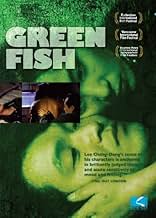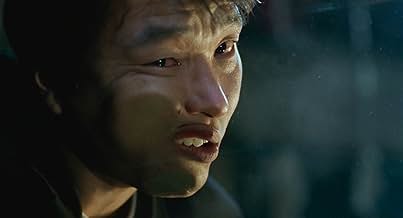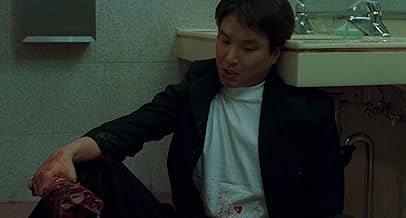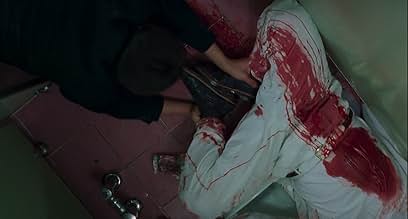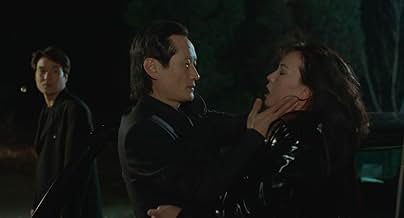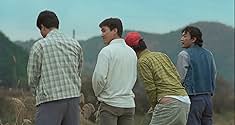AVALIAÇÃO DA IMDb
7,0/10
2,4 mil
SUA AVALIAÇÃO
Adicionar um enredo no seu idiomaReturning home and finding his town drastically changed, a former soldier falls in with gangsters.Returning home and finding his town drastically changed, a former soldier falls in with gangsters.Returning home and finding his town drastically changed, a former soldier falls in with gangsters.
- Prêmios
- 20 vitórias e 6 indicações no total
Kim Dong-gon
- Sandwich Man
- (as Dong-gon Kim)
Myeong Gye-nam
- Kim Yang-kil
- (as Gye-nam Myeong)
Lee Ho Sung
- Elder brother
- (as Ho-Sung Lee)
Park Hye-Sook
- 3rd Brother's wife
- (as Hye-sook Park)
Son Yeong-soon
- Mother
- (as Young-Soon Son)
Avaliações em destaque
Lee Chang-Dong's movie have common themes I have noticed as I move backwards through his oeuvre. Male protagonists romance story tied up in a class system or one hierarchical social structure or another. Its about the indignation and class struggle, being mislead by the bright lights, whether it be women fame or fortune. The good are seldom rewarded and success is not won by having principles. Its more like a 'dogme 95' movie than a hollywood affair.
Its not overly violent and the overall tone is kinda light considering the bleak outcome of the story, conveying the absurdity of life rather than looking at it in a nihilistic way. City scapes contrast with rural city outskirts as do the inhabitants; this again puts it in similar ground to his latest movie Burning, which has alot in common with this one in many thematic ways. I would say that his fim making skills have grown and Burning was better, the cinematography for one thing is superior in the latter.
I saw this a few years ago and remember it as sad, graceful and often funny, with a few strikingly memorable images, like the one of the glowering night club singer. Its story of a young Korean man from a loving but troubled home who ends up working for the local hoods is not wildly original, but it's well done. It is kind of unassuming and low-key, so that when the credits trekked over the final scene (which the audience rightly applauded) I was surprised at how touched I was, and I remember it overall with more clarity than most films I see.
Green Fish is not a real gangster movie, but more an illustration of the battle between good and evil, between innocence and depravity, between the righteous one and those who only believe in the law of the strongest, between the city (and all its poisons) and the countryside (with its green fish). The law of the strongest is not only a matter of physical forces (strength, number), but also of mental ones (deception, manipulation, ambush, cynicism of the individual). The film has also a socio-economic dimension: the protagonist of the movie is a young man who has been released from the army. He has no job, but is hired by the immoral leader of a gang who appreciates his courage, his sincerity and his 'morality' (his sense of justice). And the women in all that? They have no other choice but to follow the strongest, if, and only if, they are young and beautiful. As for the unborn child, there is more than serious doubt about the real father
The first film by Lee Chang-dong contains already many ingredients of his later movies: a train, spasticity, gratuitous violence or exploitation of innocence. It says a lot about the director's vision on the way of the world.
The first film by Lee Chang-dong contains already many ingredients of his later movies: a train, spasticity, gratuitous violence or exploitation of innocence. It says a lot about the director's vision on the way of the world.
I purchased this movie after reading some of the very positive reviews found on this site but what a disappointment it was. It is not that the film is terribly bad, it's simply one of the many stories focused on innocent people entering the gangster world and their struggle to remain true to themselves and what they stand for in life.
GREEN FISH, just simply is not very unique or particularly moving. Yes, there are a few subplots and themes that make you want to follow the story and promise it to be an interesting one, but somehow, I feel the narrative does not gather the strength that it could have achieved to make it a remarkable story. At this stage and age it is very difficult to exploit the exploited, and a simple change of setting does not work miracles. If there is something that works well for the film, it must be the character insight, however, this does not make up for all of its weaknesses. In all, not a bad movie but I would not really recommend it as enthusiastically as others have done. Korean cinema has much higher quality representatives than this one.
GREEN FISH, just simply is not very unique or particularly moving. Yes, there are a few subplots and themes that make you want to follow the story and promise it to be an interesting one, but somehow, I feel the narrative does not gather the strength that it could have achieved to make it a remarkable story. At this stage and age it is very difficult to exploit the exploited, and a simple change of setting does not work miracles. If there is something that works well for the film, it must be the character insight, however, this does not make up for all of its weaknesses. In all, not a bad movie but I would not really recommend it as enthusiastically as others have done. Korean cinema has much higher quality representatives than this one.
Lee Chang-Dong recently got a lot of attention when his latest movie OASIS one multiple Korean awards. OASIS is a unique movie that examines of the lives and loves of characters who normally do not get much attention from cinema or the public. It's an unusual sort of love story, and was a bad choice to watch with my girlfriend on Valentine's Day. Chang-Dong's directorial debut GREEN FISH is a far less ambitious film, but still shows the work of a talented and mature director.
Makdong (Han Suk-Kyu) is a naive young man who returns home after his spell in the army full of hopes and (small) ambitions. Now that he's a man, he wants to make a lot of money and be able to look after his family. Unfortunately, when he gets home he is treated to a little dose of reality. The area is economically depressed, and his family are not the close loving unit he wishes them to be.
Making lots of money proves to be a lot more difficult than he anticipated, as jobs in the area are pretty scarce. One area that does offer employment is crime, as the area is controlled by the gangs. A chance encounter with a young woman leads him to meet a gang boss who seems to be a little more respectable than most, and when he's told he won't have to break the law he accepts a job.
The boss takes a liking to Makdong's simplicity and straightforward character and looks after him well, to the resentment of other members of the gang. Despite the promise of legitimacy, he learns that gangs cannot really live by the law, and he gets drawn further into the criminal life.
GREEN FISH is a distinctly Korean film, which is not to say that all Korean films are the same (clearly not the case), but there are a few styles of film that do seem especially Korean, and this is one of them. It is a slowly paced and subtle film, allowing the story and characters to reveal themselves indirectly through the strength of the acting. The cast are all strong actors, and this allows the style of film to work. The story of an innocent young man drawn into the gangster world is not really a new one, and GREEN FISH does not try to add much that is new to it. It just focusses on the characters, their hopes and conflicts and their disappointments. The tone is not one of hope or happiness, with economic worries making reality hard. None of the characters in the movie are angels and none are devils - instead they are much more realistic human beings, full of good intentions and weaknesses.
GREEN FISH is perhaps a little too subtle, or perhaps the actors are not quite good enough for the director's ambitions. Either way, the characters remain a little vague to us, and our involvement with their stories is hence slightly diminished. It is still a movie of strong characters, however, and a well told story until the slightly weak ending.
Korea produces some very strong dramas, with a high level of "art" being found in much of the nation's cinematic output. GREEN FISH is an accomplished debut that fits well with recent Korean cinema, though it is a little too conservative to be classed in the higher ranks. Good for a first film though, and Lee Chang-Dong is definitely a director to keep an eye out for.
Makdong (Han Suk-Kyu) is a naive young man who returns home after his spell in the army full of hopes and (small) ambitions. Now that he's a man, he wants to make a lot of money and be able to look after his family. Unfortunately, when he gets home he is treated to a little dose of reality. The area is economically depressed, and his family are not the close loving unit he wishes them to be.
Making lots of money proves to be a lot more difficult than he anticipated, as jobs in the area are pretty scarce. One area that does offer employment is crime, as the area is controlled by the gangs. A chance encounter with a young woman leads him to meet a gang boss who seems to be a little more respectable than most, and when he's told he won't have to break the law he accepts a job.
The boss takes a liking to Makdong's simplicity and straightforward character and looks after him well, to the resentment of other members of the gang. Despite the promise of legitimacy, he learns that gangs cannot really live by the law, and he gets drawn further into the criminal life.
GREEN FISH is a distinctly Korean film, which is not to say that all Korean films are the same (clearly not the case), but there are a few styles of film that do seem especially Korean, and this is one of them. It is a slowly paced and subtle film, allowing the story and characters to reveal themselves indirectly through the strength of the acting. The cast are all strong actors, and this allows the style of film to work. The story of an innocent young man drawn into the gangster world is not really a new one, and GREEN FISH does not try to add much that is new to it. It just focusses on the characters, their hopes and conflicts and their disappointments. The tone is not one of hope or happiness, with economic worries making reality hard. None of the characters in the movie are angels and none are devils - instead they are much more realistic human beings, full of good intentions and weaknesses.
GREEN FISH is perhaps a little too subtle, or perhaps the actors are not quite good enough for the director's ambitions. Either way, the characters remain a little vague to us, and our involvement with their stories is hence slightly diminished. It is still a movie of strong characters, however, and a well told story until the slightly weak ending.
Korea produces some very strong dramas, with a high level of "art" being found in much of the nation's cinematic output. GREEN FISH is an accomplished debut that fits well with recent Korean cinema, though it is a little too conservative to be classed in the higher ranks. Good for a first film though, and Lee Chang-Dong is definitely a director to keep an eye out for.
Você sabia?
- ConexõesFeatured in Son-nim-eun-wang-e-da (2006)
Principais escolhas
Faça login para avaliar e ver a lista de recomendações personalizadas
- How long is Green Fish?Fornecido pela Alexa
Detalhes
- Tempo de duração1 hora 51 minutos
- Cor
- Mixagem de som
- Proporção
- 1.85 : 1
Contribua para esta página
Sugerir uma alteração ou adicionar conteúdo ausente


